#mental health ocd
Explore tagged Tumblr posts
Text
Happy OCD Awareness Week!!

Second Week of October ( October 13th-20th, 2024 )
I don't see enough posts on this website about this awareness week, so I just wanted to come on here and talk a bit about the condition, the reality of having OCD, debunking myths, explaining how OCD functions in the brain, etc..
Firstly, let's get through the basics!
What is OCD?
Obsessive-Compulsive Disorder is a chronic, long-lasting mental health disorder that is primarily made up of two major components — obsessions and compulsions. People with this condition experience repetitive, unwanted, and often horrifying intrusive thoughts (obsessions) that lead to repetitive or ritualistic behaviors known as compulsions. Compulsions are performed in order to alleviate the anxiety and distress that are brought up by obsessions and serve as a way to neutralize or get rid of them.
Intrusive thoughts (obsessions) don't always come in the form of a random 'what if' thought. They can show up as urges, mental images, commands, ideas, and even physical sensations.
Compulsions are typically depicted as physical acts such as hand washing and cleaning or organizing. Did you know OCD compulsions can also be mental? Some people with OCD, such as myself, experience what is known as Pure-O. This is a subtype where the person has mental compulsions that are invisible and can't be observed by others. Examples of mental compulsions are counting, mental reviewing, compulsive praying, and more!
Understanding OCD starts with understanding the cycle!

What are Intrusive Thoughts, and Where Do They Come From?
If you've been on the internet a lot, you may have come across the term "intrusive thoughts." Unfortunately, like many other mental health terms, it has been widely misused on platforms such as Tiktok and revised to mean something that it does not — often getting confused for impulsive thoughts.
Intrusive thoughts are defined as unwanted, involuntary thoughts, images, or ideas that pop up in the mind and are often taboo and/or terrifying. One important thing to note is that they are "ego-dystonic," meaning that they are opposite to a person's true character, beliefs, and desires. This is what makes them so distressing and confusing for folks with OCD and other disorders.
But where do they come from exactly? Some researchers believe that intrusive thoughts are misinterpreted warning signals from the brain. Our brain projects these thoughts and images to warn us about potential dangers so that we can avoid these hypothetical situations and be prepared. (ex: standing on the side of a tall bridge and getting a random thought of jumping off) Similarly to why we experience feelings of anxiety. However, if you live with OCD or other conditions such as PTSD, this system is in overdrive and no longer functions properly.
The Reality of OCD
OCD is one of the most misunderstood and trivialized mental health conditions in the world. Many cultures have a very idealistic view of the disorder, often reducing it down to a personality quirk and has even been seen as a "beneficial" disorder to have. This could not be further from the truth and the reality of living with Obsessive-Compulsive Disorder is much more grim and scary. Living with this condition looks like so many things for so many people, so lets play a game!
(DISCLAIMER: If this is triggering for you, don't participate!!!) Imagine your worst fears. Think about how horrified you would be if those fears came true. If they have come true, remember how you felt in that moment.
Now imagine living with a brain that involuntarily forces you to think about those fears and gives you the false signal that they might come true if you don't do something to prevent it. Imagine doing something to prevent that fear from happening, but all it did is reinforce those fears even stronger, and now you're trapped thinking about them for what feels like an eternity.
THIS IS OCD!
A person living with Obsessive-Compulsive Disorder will spend at least an hour or more performing compulsions in response to these obsessions. Onlookers might see us performing a compulsion and not understand why we're doing them. What you see on the outside is VERY different from what's going on in the inside. WE DO NOT ENJOY OUR COMPULSIONS, OR OUR OBSESSIONS!!!
Although obsessions don't always have to be centered around fear. Obsessions present in an infinite number of ways and look very different for each individual.
Common OCD Subtypes:
Contamination OCD, Harm OCD, Pedophilia OCD, Relationship OCD, Sexual Orientation OCD, Religious (Scrupulosity) OCD, Magical Thinking OCD, Suicidal OCD, and much more!
These obsessions can latch onto any part of you or your life. They can attack your fears, values, morals, identity/self-concept, relationships, and even trauma.
The Role of DOUBT
Did you know OCD has a nickname? It's known as the "doubting disorder." This is because doubt is a hallmark symptom of OCD and plays a huge role in the way OCD presents. When you have this disorder, you're unable to trust your own reality and you lack confidence in your attention, memory and perceptions. While most people can have an intrusive thought and brush it off, a person with OCD will experience a cognitive distortion where we apply meaning to these thoughts. "What does this thought mean?" "What does it say about me?" "What does it say about the future?" which forms an obsession and causes intense feelings of anxiety, distress and dread. We are unable to handle the uncertainty of these thoughts and what it says about reality. Therefore, we perform compulsions.
If you ask a person with OCD what it's like. You'll often hear it depicted as an evil entity hijacking our brains, having two brains, or being in an abusive relationship with your own brain.
In my experience, it really is similar to being in an abusive relationship with your brain. OCD comes into your life and gives you a false sense of security. It wants you to believe that it's there to keep you safe. But OCD is like a leech. It gets fuel off of your compulsions and uses that fuel to strike you with more obsessions while simultaneously gaslighting you and making you believe that you're crazy for having these thoughts. It convinces you that you need to keep performing compulsions because "it keeps you safe" when, in reality, compulsions reinforce our cycle. Compulsions may help you temporarily. But, what actually happens is that you're teaching your brain that the obsession was, in fact, a real threat and performing that compulsion actually protected you. This makes you more likely to perform that compulsion again when the obsession resurfaces because your brain is tricked into thinking it's a safe mechanism.
When we re-experience our obsessions, they may even multiply overtime. I'm going to give a personal example!!
In 2022, I experienced a severe Relationship OCD episode where I was plagued with fears of a person abandoning me. The initial obsession was "im afraid of this person leaving me" and after performing a compulsion, it then went from that thought to "what if I hurt him and he abandons me?" and then to "what if he finds somebody better and replaces me, which means he'll abandon me!!!!!" So every new intrusive thought can be traced back to the initial obsession — the fear of abandonment. Every compulsion performed keeps you more and more stuck.
Debunking Myths and Misconceptions
Myth #1: OCD is about being overly clean and organized.
While obsessions with cleanliness and symmetry do exist, this stereotype oversimplifies these behaviors and fails to recognize the deeper issues that cause these ritualistic actions. The act of cleaning things excessively or rearranging items is often dumbed down to a preference, when the reality is that the person is trying to reduce their anxiety stemming from unsettling obsessions.
Myth #2: OCD is just a personality quirk
This often coincides with the first one. A personality quirk is something that is taken lightly, but this is a mental ILLNESS. We cannot simply control these obsessions and compulsions, even though a majority of us are aware of the irrational and excessive nature of them. We do not enjoy them and they cause impairment, affecting multiple areas of our lives.
Although the exact cause of OCD is unknown, it's thought to be a combination of factors such as genetics, brain structure, and environmental factors such as chronic stress or traumatic life events.
Myth #3: Everyone is "A little OCD"
OCD is often used as an adjective to describe certain traits or behaviors such as being clean and organized. This language is highly dismissive of those living with the actual condition and paints an inaccurate picture of the disorder, more palatable for the general public to "relate to"
YOU DO NOT HAVE OCD JUST FOR HAVING A PREFERENCE FOR CLEANLINESS. IF YOU LIKE IT, IT'S NOT OCD!!!!!
OCD is a more complex condition than the general public makes it look. Reminder that the OCD brain is physically structured differently. It is a neurobiological disorder.
Myth #4: OCD is rare
According to the International OCD Foundation, 1 in 40 adults have it, or will develop it. 1 in 100 children and teens have the condition, which is about the same number of autistic youth worldwide. This may only account for those with an official diagnosis. Many go undiagnosed for years due to harmful misconceptions and stigma.
Myth #5: OCD isn't treatable
OCD isn't curable, but it can be treated with a combination of medication and therapy. ERP therapy is the golden standard treatment for OCD, but some may benefit from other forms of therapy. Antidepressants, or SSRIs, are also used.
Myth #6: Compulsions can only be physical
As discussed before, there is a subtype called "Pure-O OCD" or "Pure OCD" this name can be misleading because it implies that there are only obsessions, but people with this subtype experience mental compulsions. This type of OCD is harder to detect and people often don't realize they're performing mental compulsions because they feel more "automatic" and are seen as normal to the person performing the compulsions.
There are more misconceptions, but I'll leave it there!!!
Let's Talk Stigma!
While the stereotypes applied to OCD often leave the condition to be trivialized and not taken as seriously as other mental health conditions, it can be just as demonized.
In recent years, we've seen a surge of people opening up about their OCD-related intrusive thoughts/obsessions, only to be met with scrutiny from others who don't understand what intrusive thoughts are.
Intrusive thoughts are wrongfully understood as "hidden desires" that a person is trying to suppress. This idea perpetually paints a person struggling with intrusive thoughts as a "dangerous" person who needs to be avoided and locked away. Thought crimes do not exist, but our thoughts are often viewed as criminal if they are not socially acceptable. This can inadvertently worsen a person's OCD symptoms and cause more unnecessary reactions to thoughts that aren't based in reality. For example, highly stigmatized subtypes such as Pedophilia OCD involve intrusive thoughts about children that the sufferer does NOT align with. If they did, they wouldn't feel the need to perform compulsions. They wouldn't experience such intense anxiety and distress as a result. The real them doesn't want to hurt children. The real them may value the children in their lives (like a family member) but living with OCD means that it can ATTACK YOUR VALUES. OCD IS A GASLIGHTER!
This leads me into the ever exhausting topic of *sigh* Tiktok trends! If you've been around, you've probably seen the phrase "I let the intrusive thoughts win"
This trend is very damaging for OCD sufferers and has inadvertently added to the stigma and misconceptions around the disorder. Not only is the term 'intrusive thought' being widely misused across the internet to mean something that it doesn't, but the phrase itself is an oxymoron.
Users who participate in this trend often confuse an intrusive thought with an impulsive thought. They'll come across a thought such as "I should dye my hair pink" and get on social media with pink hair, claiming that they "let the intrusive thought win" when they actually acted on an impulse, an IMPULSIVE thought. This is harmful for those living with intrusive thoughts because it incites the idea that people dealing with an intrusive thought may act on those thoughts. So whenever a person comes on social media and decides to open up about their OCD-related intrusive thoughts, they're met with backlash from people who claim that those aren't intrusive thoughts, when they in fact ARE. People have conflated these two types of thoughts, leading to further misunderstandings of intrusive thoughts and OCD as a whole.
Additionally, this phrase doesn't make sense. It's an oxymoron, meaning that it directly contradicts itself.
Little PSA to those reading:
THERE IS NO SUCH THING AS LETTING AN INTRUSIVE THOUGHT WIN. IF IT "WINS" IT WAS NEVER AN INTRUSIVE THOUGHT, IT WAS AN IMPULSE!!!
A person living with intrusive thoughts are the least likely to act on them, the opposite of an impulse. We are terrified of them. We do not entertain them.
Closing Off
If this post resonates with you and you're suspecting that you or somebody you love might be dealing with OCD, please try and book an appointment with a mental health professional who can diagnose you. I will link some resources below to help you get started!!
Living with OCD can look different for everybody, as it is a very individualistic disorder, but it can be extremely debilitating. The World Health Organization (WHO) has ranked OCD among one of the top 10 most disabling conditions worldwide, of any kind. Yet, OCD still remains one of the most misunderstood and trivialized mental illnesses. It's a much more complex disorder than people realize and can be easily confused with other conditions. I do support research-based self diagnosis, but if you're going to, please keep in mind that OCD is more than experiencing an intrusive thought. There is a diagnostic criteria that must be met.
OCD isn't cute, funny, or quirky. It's not a benefit to those who have it. It should be taken just as seriously as other mental disorders, but unfortunately, it's not. Statistics show that people living with OCD are 10x more likely to die by suicide and more struggle with ideation due to the velocity of obsessions. Many people with OCD report feeling incredibly lonely, as obsessions and compulsions take up many hours of their day and cause them to stay stuck in their heads, unable to connect to the world around them. So if you or somebody you love is struggling with OCD, just know that there is help out there for you. You're never alone, and remember: YOU ARE NOT YOUR THOUGHTS!!
List of Resources Here!

#ocd awareness week#ocd awareness#ocd#obsessive compulsive disorder#actually obsessive#actually obsessive compulsive#actually ocd#mental health ocd#reality of ocd#intrusive thoughts#obsessions#compulsion#actually compulsive#obsessive compulsive behavior#obsessive compulsive spectrum#mental health#mental health issue#mental illness#mental health is important#mental heath awareness
30 notes
·
View notes
Text
no can we talk about how this mindset makes OCD WORSE???
we are living with a brain and a nervous system that struggles to separate our thoughts from our reality. while most of us are aware that our thoughts and behaviors are irrational, the role that excessive doubt plays in the disorder is powerful enough to convince a person with OCD that we cannot take ANY chances and that we have to take these thoughts as a THREAT. hence why our nervous system activates fight or flight mode, and we begin to perform compulsions.
intrusive thoughts, in general, are direct contradictions of who we are as people. but when you live with OCD, we are incredibly fearful that these thoughts are true or will come true, regardless of how farfetched they can be. that's because our brains quite literally, by DEFINITION, gaslights us. WE ARE NOT OUR FUCKING THOUGHTS. we are suffering WAY more as a result of these thoughts than you ever will just by hearing about them. if we were aligned with our intrusive thoughts, we wouldn't be performing compulsions to prevent these thoughts from coming true.
SO WHEN IGNORANT PEOPLE go around and treat us like we ARE our intrusive thoughts, that magnifies our already irrational worries and that can send people spiraling. we are essentially trapped in a feedback loop, and people can just as easily contribute to it.
not naming any names but like 80% of this website does not understand how ocd works and i feel like that's because a lot of you guys have yet to properly comprehend that thinking about something and liking or condoning that thing are not the same thing at all. in the slightest.
#ocd rant#cw ocd#mental health ocd#actually ocd#actually obsessive#obsessive compulsive disorder#cw intrusive thoughts#intrusive thoughts#cw ableism
2K notes
·
View notes
Text


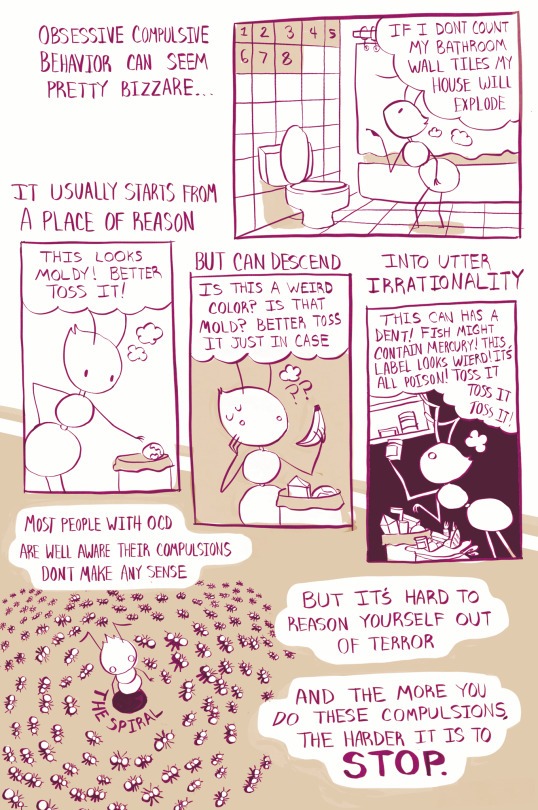
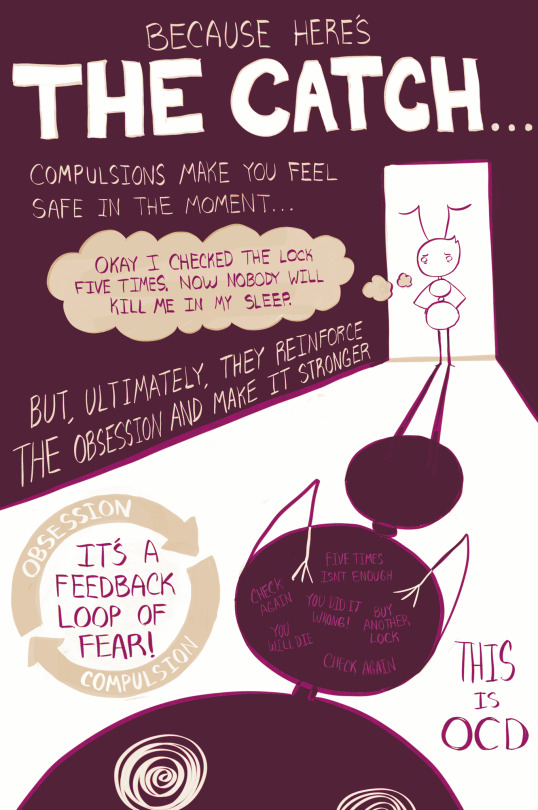

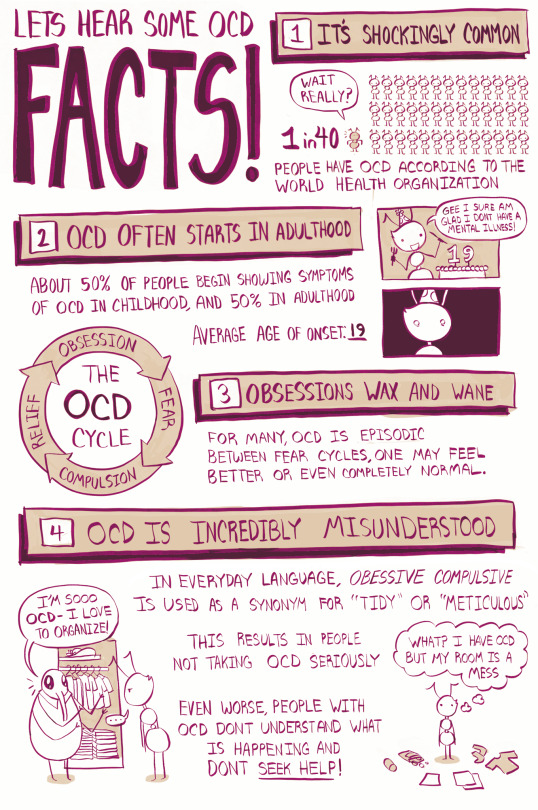
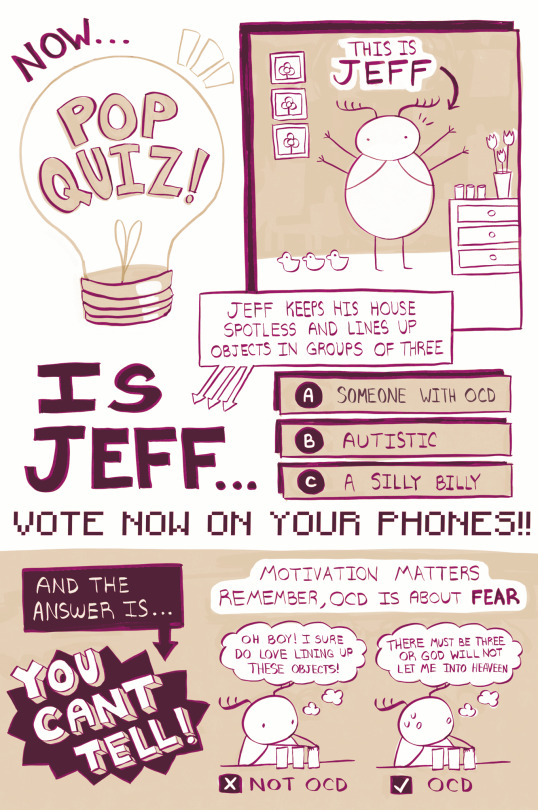


Greetings bugs and worms!
This comic is a little different than what I usually do but I worked real hard on it—Maybe I'll make more infographic stuff in the future this ended up being fun. Hope you learned something new :)
If you are still curious and want to learn more about OCD, you can visit the International OCD Foundation's website. I also recommend this amazing TED ED video "Starving The Monster", which was my first introduction to the disorder and this video by John Green about his own experience with OCD.
The IOCDF's website can also help you find support groups, therapy, and has lots of online guides and resources as well if you or a loved one is struggling with the disorder. It is very comprehensive!
Reblog to teach your followers about OCD
(But also not reblogging doesn't make you evil, silly goose)
#actually ocd#ocd#ocd tag#obsessive compulsive disorder#mental illness#mental health#neurodivergent#infographic#informative#comic#webcomic
65K notes
·
View notes
Text





a comic about OCD
17K notes
·
View notes
Text

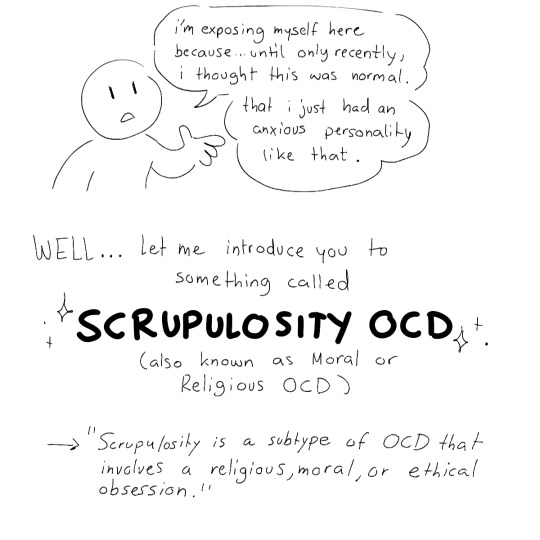

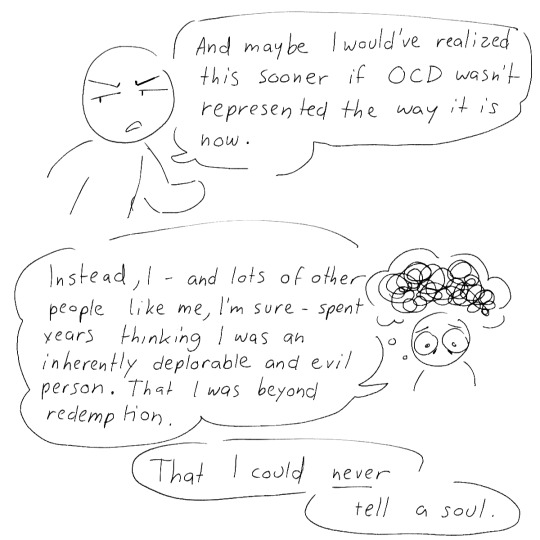


this is just a bunch of text and barely a comic sorry, but i really wanted to talk about this stuff even if i don't have the energy to properly draw
#myart#ocd#actually ocd#moral ocd#scrupulosity ocd#religious ocd#mental health#you can tell i got lazy towards the end i apologize lol#but yeah this has been on my mind ...#and the fact its so underrepresented / falsely represented is what pushed me to talk about it i suppose
10K notes
·
View notes
Text
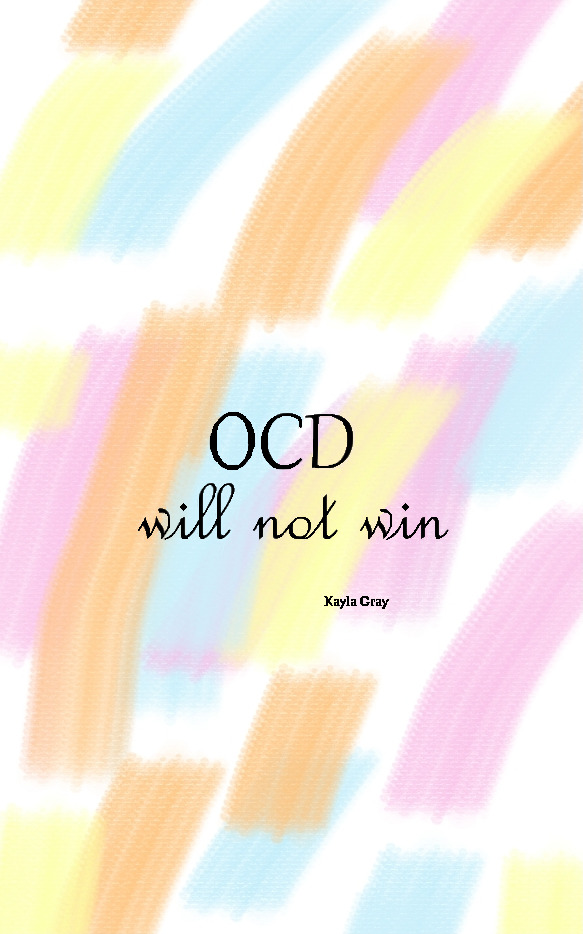
OCD will not win. OCD will not keep taking what we care about away from us. OCD will not continue to make our lives smaller.OCD will not win; I won't let it. I will keep trying my best every day, In this lifelong journey with OCD. I can still live a beautiful, fulfilling life even with the presence of OCD, and so can you. We won't let OCD win. We will keep supporting each other. We will keep advocating. We will keep doing the things that we're doing to take our life back from OCD.
This quote is from a video I made titled The story of my dress. OCD will not win. OCD recovery.
Link to the full video The story of my dress. OCD will not win. OCD recovery. (youtube.com)
Link to the Short The story of my dress. OCD will not win. OCD recovery.#OCDrecovery #OCD #OCDadvocate #OCDawareness (youtube.com)
#mental health awareness#ocd#ocd recovery#mental helath#actually ocd#harm ocd#ocd awareness#intrusive thoughts#mental health#obsessive compulsive disorder#ocd intrusive thoughts#intrusive images#intrusive thinking#mentalheathawareness#mental health art#mental health ocd#youtube#recovery#awereness
1 note
·
View note
Text
Maybe she’s born with it, maybe it’s her dads fault.
#daddy issues#bpd#actually bpd#mental health#bpd shit#mental illness#actually borderline#bpd shitposting#bpd problems#bpd mood#bpd meme#ocd#ptsd
24K notes
·
View notes
Text
Stop saying…
“Psychotic/Schizophrenic” when you mean: unpredictable, unhinged, unreal, etc.
“Bipolar” when you mean: polarized, scattered, fickle, unstable, etc.
“Delusional” when you mean: unrealistic, unreasonable, close-minded, stubborn, etc.
“[insert “R” slur in relation to intellectual disabilities]” when you mean: unreasonable, unintelligent/ridiculous, immature, etc.
“OCD” when you mean: particular, neat, overbearing, etc.
“Narcissistic” when you mean selfish, abusive, manipulative, etc.
Note: I’m NOT saying that these are synonymous. This is also not an exhaustive list.
#actually psychotic#actually schizospec#schizospec#mental health recovery#mental health stigma#actually schizophrenic#schizophrenic spectrum#mad pride#schizo spectrum#disability pride#actually neurodivergent#schizoaffective#actually narcissistic#narcissistic personality disorder#narcissism#actually ocd#ocd#stigma#cw: sanism#cw: r slur mention#actually npd
3K notes
·
View notes
Text
poor memory is a huge deal and i wish people wouldn't diminish it by saying "oh yeah i can't remember what i had for breakfast lol."
i can't remember the first 10 years of my life. i can't remember entire days, weeks, months at a time. i can't remember entire people, i can't remember names or faces. i can't remember when things are scheduled for, my calendar app on my phone is booked to the max with reminders and task checklists. i can't remember when i moved into what home when, i can't remember important milestone dates like when i got or lost certain jobs, or when i started a new hobby.
that's what i mean when i say i have poor memory. poor memory is so scary for the person who has it. it's not a quirky thing, everyone forgets small details. memory problems are scary because you can go through entire events or days with no memory, or plan for things in the future that you can't recall ever even looking into or scheduling. it's not a funny haha kind of thing, it's serious, and it affects a lot of people in very unavoidable ways.
not being able to plan for appointments or work schedules, not being able to remember people's names or faces, not being able to recall whether or not you were present for something or whether or not you met someone, not being able to keep track of what's happening on what dates and losing track of items because you can't remember where you put them are all very real problems, and anyone dealing with them deserves to be taken seriously, and not diminished when they choose to speak up about it.
#neurodivergence#mental health#adhd#did#ptsd#mental illness#schizophrenia#ocd#anxiety#generalized anxiety disorder#depression#bipolar disorder#bpd#borderline personality disorder#neurodivergent#autism#mental health awareness#dpdr#osdd#dissociative disorders#dissociative#depersonalization derealization#other specified dissociative disorder#memory problems#poor memory#learning disorders#chronic fatigue#neurological disability#neurological disorders#traumatic brain injury
10K notes
·
View notes
Text
If you advocate for mental health awareness, but joke about things like intrusive thoughts and schizophrenia, think it’s disgusting and lazy when people who are depressed can’t do things like showering or cleaning their room, use terms like “narcissistic abuse”, and believe that having ASPD, BPD, or NPD makes someone a bad person, you are not a mental health advocate. You don’t actually care about helping people or de-stigmatizing mental illness, you just want to make yourself feel like you do. You can’t pick and choose what disorders and symptoms are acceptable, and which ones make someone a bad person. Either you support everyone, or you support no one.
and if you’re neurodivergent/mentally ill and you do any of those things, you are part of the problem. there’s no such thing as “good/moral��� disorders, or “bad/immoral” disorders. We all need to have each other’s backs.
#mental health#mental illness#tw abelism#npd safe#bpd#npd#aspd safe#aspd#ocd#schizophrenia#cluster b#neurodivergent
7K notes
·
View notes
Text
There's a mistake I see a lot of people in the mental health community make and in all honesty, it's one I've made myself. But I think we should really work on it. And that's saying "if this were a physical illness, wouldn't you care?"
I've learned that no actually, people wouldn't care. Katelyn Weinstein (theADHDprincess on Twitter) is a neurodiversity acceptance activist who really put this in perspective for me. She said that it's actually more an issue of longevity than physical vs mental health.
If you're having a bad day people will generally be understanding. But when you're experiencing chronic depression and you have many bad days people lose sympathy.
In the same respect people may be understanding when you've broken a bone that will heal properly or when you have a cold that will go away soon in ways they simply won't understand when you have chronic pain or need to use a wheelchair. They may send chicken soup for a temporary situation, but when you need consistent accomodations it's an entirely different story.
I understand that from our perspective it looks like people care more about physical health than mental health, but it's good to remember that our own perspective is also limiting. Facing ableism doesn't mean you can't be ableist. And I know so many people are not ill-intentioned when they say this. I know I wasn't. But we can't discount the lived experiences of physically disabled people. If we want true equality we need to be united and we need to listen to those with physical disabilities and illnesses. And those with physical disabilities and illnesses (some of which are also invisible) have said that they are not given proper accomodations either.
So let's be united and fight for equality and accomodations for everyone, no matter what their illness or disability may be.
#fuck eugenics#ableism#ableism tw#mental health#neurodiversity#neurodivergent#actually adhd#adhd#actually ocd#ocd#mental illness#disabilty#disability rights#disabled rights#equality#allyship
37K notes
·
View notes
Text
"Saw traps for people with moral OCD" is a phrase that has embedded myself into my brain because, well, Saw traps for people with moral OCD are everywhere.
Stuff that basically amounts to...
"You have to listen to my opinions on [issue], or else you don't care about [issue]. (Constantly talks about how people like you are the absolute worst.)"
Anything that's functionally like, "you have to let me tear you down over things you can't control or you're a bad person."
Anything that's functionally like, "you have to let me vent to you whenever and however I want or else you're a bad person."
"If you enjoy X media/trope, you just hate Y people."
"Everyone knows that X thing is harmful/hateful; if you engaged in it, it's just because you were fine with perpetuating hate/harm."
"You should have just known better/should know this already!"
This thread over here talks about the inherent issues of putting this kind of stuff out there. The TL;DR is that it really only works on people who are mentally unwell and have poor boundaries, while just pissing off everyone else. It really doesn't matter if you're technically correct; you're still attacking people, and that means they're not wrong to block you.
I think that many of these Saw traps are created when people effectively write posts directed toward people who don't want to help, rather than the ones who do. Like, if you catch yourself writing an angry, shame-laden post, ask yourself: who are you writing it for and what are the odds you're going to change their minds? If your mental image is some smug fuck or angry reactionary, you're writing for the wrong person. Write for the person who's curious, who's willing to learn.
Also? Work on figuring out how to transmute negative feelings into positive, encouraging rhetoric. EG:
"Why is there no X positivity?" -> "Let's hear it for X!"
"No one cares about Y problem!" -> "Hey, we need more recognition of Y problem" or "I haven't seen many people talking about Y problem, so here's some info on what's up."
"If you don't reblog this, you don't care about [group]" -> "Please reblog this, it would mean a lot for us [group]."
And if you're really super duper frustrated and want to vent with a lot of nasty words and sentiments? Consider taking it to a private vent channel or a journal or somewhere that a stranger with moral OCD/scrupulosity isn't likely to run across it.
Remember, most people don't want to hurt anyone. More people are ignorant than malicious. People naturally want to do the right thing, so if you feel like you have to guilt them or shame them into it, there's probably a fundamental communication issue somewhere, or they simply lack the context to understand why what you're saying is so important.
#moral ocd#mental health#mental illness#ableism#scrupulosity#scrupulosity ocd#abuse#emotional abuse#communication
8K notes
·
View notes
Text
What really sucks is when you know you should be doing something but physically/mentally cannot bring yourself to do it no matter how important doing that thing is.
#mental health#mental illness#mental illnesses#depression#anxiety#bpd#bipolar#ed#ocd#important#self care#self love#adhd#autism
3K notes
·
View notes
Text
‘letting my intrusive thoughts win’
shut the fuck up.
you’re referring to impulsive thoughts, intrusive thoughts are undesirable and often horrific for the person experiencing them. you dying your hair randomly is not an intrusive thought.
if i let my intrusive thoughts dictate my actions, id be in jail for a long fucking time.
#actually mentally ill#clusterb#actually npd#npd#actually aspd#aspd#cluster b#actuallynpd#actuallyaspd#actually bpd#bpd#actuallybpd#ocd#actually ocd#actually schizophrenic#schizospec#intrusive thoughts#intrusive thinking#impulsive#actually cluster b#cluster b personality disorder#misusing mental health terms isn’t funny or quirky you’re just annoying#mental illness#mental health terms#fuck tiktok#actually borderline#actually antisocial#actually narcissistic#actually obsessive#obsessive compulsive disorder
3K notes
·
View notes
Text
hey i just wanted to give a shout out to people with personality disorders real quick. your disorder doesn't make you evil, it doesnt make you an abuser, and it doesnt make you unlovable. you're just as deserving of respect, care, and support as people without personality disorders. stay safe, i love you and i hope you have a happy holiday season. we're in this together <3
#also i hope you remember it's not your fault#i love you so much muah#bpd#borderline personality disorder#npd#narcissistic personality disorder#schizophrenia#aspd#histrionic pd#ocd#bpd positivity#npd positivity#ocd positivity#personality disorder#mental health#mental health awareness#mental health positivity#mental illness positivity#not mlm#dantes talking again
3K notes
·
View notes
Text

OCD will not win. OCD will not keep taking what we care about away from us. OCD will not continue to make our lives smaller.OCD will not win; I won't let it. I will keep trying my best every day, In this lifelong journey with OCD. I can still live a beautiful, fulfilling life even with the presence of OCD, and so can you. We won't let OCD win. We will keep supporting each other. We will keep advocating. We will keep doing the things that we're doing to take our life back from OCD.
This quote is from a video I made titled The story of my dress. OCD will not win. OCD recovery.
Link to the full video The story of my dress. OCD will not win. OCD recovery. (youtube.com)
Link to the Short The story of my dress. OCD will not win. OCD recovery.#OCDrecovery #OCD #OCDadvocate #OCDawareness (youtube.com)
#ocd#ocd recovery#mental helath#mental health awareness#actually ocd#harm ocd#ocd awareness#intrusive thoughts#mental health#youtube#ocd intrusive thoughts#obsessive compulsive disorder#OCD#intrusive images#intrusive thinking#mentalheathawareness#mental health art#getting your life back#recovery#Mental health ocd
1 note
·
View note